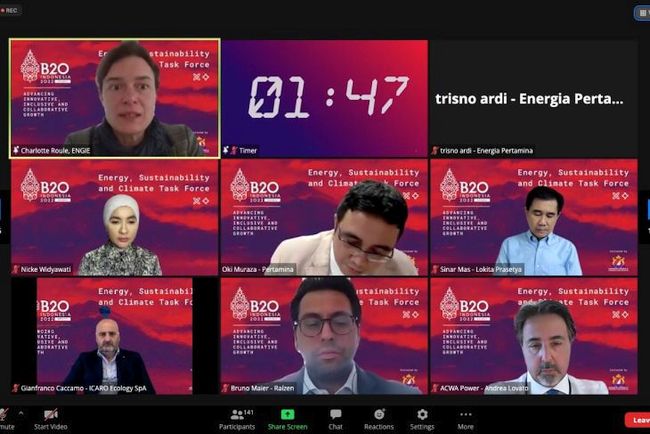The B20 Energy, Sustainability & Climate Task Force, led by state-owned oil giant Pertamina Group, put forth three recommendations to support realization of the target of net-zero carbon emissions.

The B20 Energy, Sustainability & Climate (ESC) Task Force held entitled the third Task Force Call Meeting on Thursday, April 19 (ANTARA/HO-Pertamina)
“Climate change sustainability is something that we must strive for in the future. For this reason, the B20 Energy, Sustainability, and Climate Task Force has compiled policy recommendations that focus on three recommendations, with 12 policy actions that call for global cooperation,” Deputy Chair of B20 Energy, Sustainability, and Climate Task Force Agung Wicaksono said in a statement obtained here on Thursday.
He delivered the statement during the hybrid dialogue forum of Energy Transition in Growth Markets on Tuesday (June 21).
This forum is one of the events conducted by the Task Force Energy, Sustainability & Climate (ESC) and the Task Force Future of Work and Education in collaboration with the Accenture International Utilities and Energy Conference held on June 21-23, 2022, in Rome, Italy.
Themed “Maximizing the Value of the Energy Transition in Growth Markets and Paving the Way to B20,” this forum discusses the future of the energy industry in an era that prioritizes sustainability and low emissions for a green future and a more sustainable planet.
The three policy recommendations include accelerating the transition to sustainable energy use by reducing carbon intensity in different ways. The second is ensuring a just, orderly, and affordable transition to sustainable energy use. The third recommendation pertains to increasing energy security, so that consumers can access and consume clean and modern energy.
“We are working hard to ensure there is an alignment between the performance targets set by the Italian B20 last year and our performance targets this year, so there will be a continuity,” Wicaksono stated.
To ensure a fair, orderly, and affordable transition to sustainable energy use, Wicaksono stated that the pricing in developing countries should be taken into consideration. Thus, it is necessary to formulate ways to integrate the benefits of carbon pricing into the energy transition pricing.
“With the energy transition, we must also think about the security and availability aspects of world energy. At the same time, we must also ensure that everyone has access to clean and modern energy,” he emphasized.
The managing director of Jababeka Infrastructure stated that the potential of decarbonization towards net-zero emission also comes from industrial areas. Furthermore, he invited companies in the B20 to conduct global collaborations that will result in business actions, as the provision of renewable energy for industrial companies with a large demand can contribute to achieving the energy transition target, he affirmed.
Wicaksono also accentuated the importance of energy transition and the important role of the B20 Energy, Sustainability, and Climate Task Force in achieving energy transition priorities, especially to achieve net-zero emissions.
On the same occasion, Chairman of the Indonesian Chamber of Commerce and Industry Arsjad Rasjid stated that currently, the main players in the energy and utility areas are facing challenges.
Collaboration becomes increasing important for achieving significant reductions in carbon emissions and a progressive transition from carbon-generating energy to environmentally friendly, greener, and sustainable energy, Rasjid stated.
“The transition to greener energy does not mean stopping profits for the company. The company’s move towards clean energy will create added value for brands and consumers to become more confident and have a positive outlook,” he remarked.
Head of Indonesia’s B20 Organizer, Shinta Kamdani, stated that energy transition should provide benefits and not create burden. Kamdani pressed for making meticulous preparations for the energy transition, including conducting mitigation of the costs and impacts.
“This energy transition certainly requires substantial financial support. The G20 countries, which contribute 80 percent of the world’s economy, are expected to provide this support for the transition process. Several main priorities must be put forward in this energy transition, such as accessibility, technology, and funding,” Kamdani stated.
The event was moderated by Gianfranco Casati and Valentin de Miguel from Accenture that are the Co-Chair and Deputy Co-Chair of the B20 Energy, Sustainability, and Climate Task Force.
The forum also presented other keynote speakers: the Chair B20 Future of Work & Education Task Force/President Director of Astra Otoparts/Director of PT Astra International Tbk, Hamdhani D. Salim; Co-Chair B20 Future of Work & Education Task Force/IOE Vice President to The ILO, Renate Hornung Draus; WEF Head of Energy, Materials and Infrastructure, Kristen Panerali; and ENI Evolution CEO, Giuseppe Ricci.
Contact: Fajriyah Usman, VP Corporate Communications, PT Pertamina (Persero)
M: +62 858 8330 8686, Email: fajriyah.usman@pertamina.com, URL: https://www.pertamina.com
Written by: Azis Kurmala, Editor: Sri Haryati (c) ANTARA 2022
